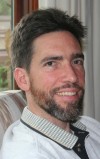A pair of Asheville psychiatrists are using technology to link people around the globe while promoting the work of groundbreaking Swiss analyst and author Carl Jung. Considered one of fathers of modern psychology, Jung was a trailblazer in exploring human consciousness, including its darker side.
Using the Internet, The Asheville Jung Center — co-founded by Steven Buser and Leonard Cruz — presents interactive training seminars featuring Jungian specialists worldwide.
“That is a neat way of learning,” says Buser. “You can reach an expert who is so far away.”
Buser studied medicine at Duke and then received clinical training at the C.G. Jung Institute of Chicago, drawn by Jung’s more holistic approach to health. “Medicine seemed too technical,” he explains. “I was treating a particular part of a person but not treating the whole person.”
Accordingly, Buser talks to patients about exercise, diet, spirituality and their personal concerns. He also prescribes medications when this seems appropriate, such as when mental illness is suspected.
A few years back, Buser taught some classes at the Mountain Area Health Education Center, using a webcam and video link to communicate with students in remote locations. That got him thinking.
“If you connect with someone in Raleigh, why not in Zurich?” he wondered. Jung lived most of his adult life there, and many of the top Jungian scholars still live and work in the Swiss city.
After consulting with the tech folks at MAHEC, Buser determined that he could connect people from all over the country to a video feed in Asheville.
At a conference, Buser met Murray Stein, president of the International School of Analytical Psychology, and suggested that the Jungian analyst and author conduct a live video training from his home in Zurich.
That session took place in 2008: People from Charlotte; Omaha, Neb.; Mexico City and elsewhere logged into the video feed in Asheville to hear Stein speaking from Switzerland.
News of the training session spread via emails, blogs and word of mouth.
“From there, it just took off,” says Buser.
A worldwide hub
Inspired, Buser spoke with Cruz, a colleague at the Family Life & Learning Center on Hendersonville Road, about collaborating on the training sessions, and The Asheville Jung Center was born. Although there are various Jungian centers around the country, none has the Asheville organization’s scope and reach, notes Buser.
“The main goal was to develop a worldwide Jungian hub,” he explains. “It’s nice that it is in Asheville, but it is worldwide. We find the best Jungian teachers in the world.”
The scholars present material, and people who are logged in can ask questions, either via live audio/video or email. Buser serves as the gatekeeper, screening the emails and making sure the discussion moves forward.
Recently, the Jung Center moved the portal for the training sessions from MAHEC to UNCA. “It’s been a win-win situation, because the university has been a vehicle for worldwide learning,” says Cruz.
The innovative approach has created some interesting situations. For example, some people planning a trip to Asheville inquired about visiting UNCA’s Jung Center; Cruz and Buser have had to explain that it exists only online, though the conferences are connected at the campus.
Cruz, however, believes Jung would have had mixed feelings about the project, approving of using new teaching tools while perhaps lamenting the lack of a more intimate learning experience.
Indeed, Cruz himself confesses to some ambivalence concerning the Internet and online communities. Some people today, he maintains, are more interested in virtual relationships than in real human contact. “I feel like Rome is burning, and we are adding fuel to the fire,” Cruz observes.
The Asheville Jung Center sells DVD versions of the lectures and other material it offers. Meanwhile, the focus of some of the discussions is changing. For example, the group plans to screen Black Swan, an Oscar-winning movie starring Natalie Portman as a mentally ill ballet dancer, followed by a discussion of how the film relates to Jung’s work.
Buser says he doesn’t see mental health professionals using video technology much, though it’s useful for training.
“It’s OK, but somehow it loses a lot,” he points out. “There is something different about a person being in the room.”




Before you comment
The comments section is here to provide a platform for civil dialogue on the issues we face together as a local community. Xpress is committed to offering this platform for all voices, but when the tone of the discussion gets nasty or strays off topic, we believe many people choose not to participate. Xpress editors are determined to moderate comments to ensure a constructive interchange is maintained. All comments judged not to be in keeping with the spirit of civil discourse will be removed and repeat violators will be banned. See here for our terms of service. Thank you for being part of this effort to promote respectful discussion.